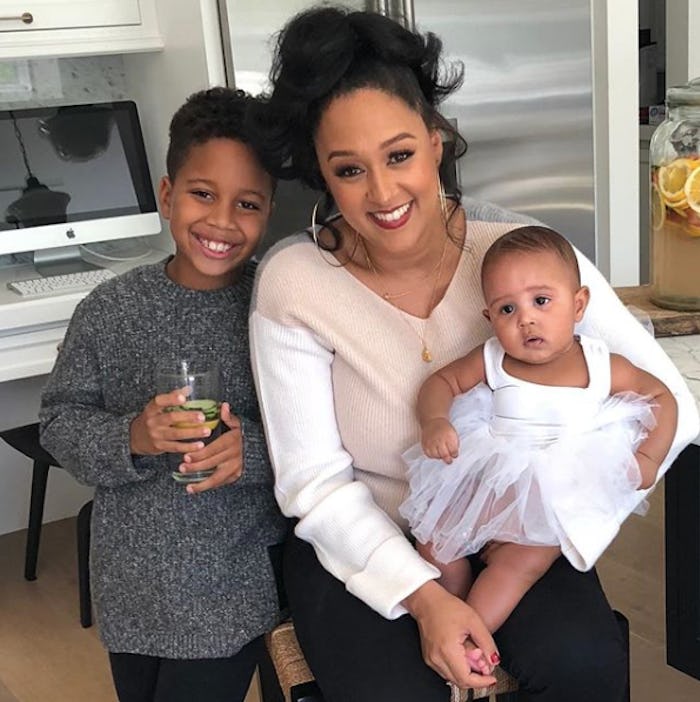Entertainment

Tia Mowry: What I’m Teaching My Kids About Being Black In America As They Grow Up
A few months back a kid at summer camp told my son his skin color wasn’t pretty. At just 7 years old, my son was forced to face racism in a place where he should have only ever felt safe. It brought me back to when I first heard the N-word and my mother explained, “There are some people out there who don’t like black people and they are mean.” I was 8 years old. Whether or not you want to address racism with your children, you must because ignorance is out there and they need to know how to handle it.
Growing up, I had insecurities about my appearance and about my place in this world because I never saw my image portrayed positively in popular media. That is until I found my mom’s stash of magazines: Essence, Ebony, and Jet. Thank God for those images! Being a woman is hard in general, but being a black woman in America and seeing black beauty overlooked crushes your self-confidence. Finally, in those glossy magazine pages, I saw women who looked like me being glorified and it made me feel great.
Then, as I got older, the social media explosion really helped me embrace my culture and my curls. As a kid, my hair was a bigger issue for me than my skin color. I remember being called “Buckwheat” in school because my hair was “poofy” — and those are not words society likes to associate with beauty.
But here was Instagram, where there were all these cute pictures of curly-haired women embracing their natural beauty, supporting each other, and that helped make me feel beautiful. It helped me embrace my culture and be proud of who I am. And thanks to that community, I know I am not the only one…
The hashtag #naturalhair currently has over 20 MILLION POSTS ON INSTAGRAM! Kinks and curls of all textures encouraging each other to go natural, to embrace YOU — all that positivity has been amazing to see and finally made me feel #blessedwithcurls. But that doesn’t mean the struggle for black women is over. In fact, it’s far from it.
There are still many challenges facing black women today. For some reason, we aren’t being taken seriously when it comes to healthcare, especially pregnancy concerns. We’re often bypassed, made to believe our word lacks validity.
This happened to Serena Williams, to Monica, and to me. With my endometriosis, I kept telling doctors about my symptoms, but was misdiagnosed for years until finally an African-American female doctor came along and said, “You have endometriosis, which happens to be very common among black women." We are as important as any other patient, and what we say and feel absolutely matters. So why aren’t we being taken seriously?
Discrimination and hate speech are born out of a narrow-mindedness that only considers one way of living and doing things. My hope is for all people to become more open-minded about the way they see the world.
Another issue I encounter frequently, given my 30-year career, is a lack of positive images and portrayals of black women and families in entertainment. Recently, I’ve seen progress in television — there’s more opportunity, more diversity. It’s getting better, yes, but we still need to do more.
There’s still an overabundance of obnoxious characters on TV centered around black women, which is not an accurate picture of real life. One of the reasons I love the series I’m doing now (Family Reunion with Netflix) is because it shows a black family embracing black culture and touching on relatable topics — things as simple as taking a road trip, traveling — and I want to see more of that!
On the show I have four children, but in real life I have two: 7-year-old Cree and 9-month-old Cairo. Being a black mom, it’s very important for me to share my history with my kids. I not only want them to understand and know their culture, but also to learn everything they can about other cultures. Cairo is still too little, but when Cree is out of school, he travels everywhere with me: Germany, Budapest, etc. I want him to see there are other people in the world that don’t look and sound like you. I want him to be open-minded, educated, and understanding in how other cultures function both at home and around the world. Discrimination and hate speech are born out of a narrow-mindedness that only considers one way of living and doing things. My hope is for all people to become more open-minded about the way they see the world.
MLK Day passed recently and, of course, I talked with Cree about Dr. Rev. Martin Luther King Jr. and all the wonderful things he did for black people. I’ll tell my daughter the same thing when she is old enough to understand. I’ll instill in her that her coils and the color of her skin are beautiful, but not only that — that true beauty comes from within. When she is grown, like mommy is now, she will be a proud black woman and she will know that who she is as a person and the culture she comes from are wonderful no matter what anyone else thinks or says. Above all, I’m going to teach both my children to love unconditionally because, even though it sounds cliché, I truly believe that love wins. It always does.
So, this is what I told my 7-year-old after the kid at summer camp made a comment about his skin color: you are smart and strong and you can do anything you put your mind to, no matter what anyone else thinks or says.